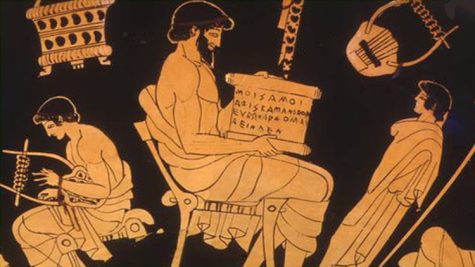The Origin of Music – Who Was the Inventor?
Who made music, and how did it develop?
There is no written record that identifies the first person to whistle a tune, sing a song, or create rhythmic noises that approximate what we now recognize as music. Nonetheless, scientists are aware that it took place thousands of years ago. Music was a part of the earliest civilizations in Asia, Europe, and Africa. Many people at the time thought of it as a heavenly creation and a gift from the gods.
Undoubtedly, music is connected to gods and goddesses from numerous religions and myths. Legends and artwork claim that the Greek god Apollo played the lyre, a string instrument and the African god Àyàn was a drummer. In the Book of Genesis, the harp and flute are credited to Jubal, an Adamic ancestor harp and flute are credited to Jubal, an Adamic ancestor.
Through the discovery of bone flutes, prehistoric cultures’ music was first clearly dated to the Upper Paleolithic around 40,000 years ago. However, it is still unknown whether the music’s true origins can be found in the older Middle Paleolithic period. Prehistoric music is mostly unknown, with only a few primitive flutes and percussion instruments serving as evidence. Yet, this evidence suggests that musical practices were practiced to some degree in ancient civilizations like the Xia dynasty and the Indus Valley civilization. The main cultures of China, Egypt, Greece, India, Persia, Mesopotamia, and the Middle East all had ancient music, which was the music of literate civilizations. The settings are frequently ambiguous. It’s not always clear if the musicians were performing as part of a festival or celebration or just for fun.
 Also, many types of people may be connected with specific musical instruments. The syrinx, a whistle-like instrument that is now known as the pan flute, was played by shepherds. It was a simple instrument that was easy to take into the fields. Two pipes made up the aulos, a more complex woodwind instrument. Because playing the aulos required more expertise, you would need instruction from a teacher; alternatively, if you were affluent, you might just hire seasoned musicians to play for you.
Also, many types of people may be connected with specific musical instruments. The syrinx, a whistle-like instrument that is now known as the pan flute, was played by shepherds. It was a simple instrument that was easy to take into the fields. Two pipes made up the aulos, a more complex woodwind instrument. Because playing the aulos required more expertise, you would need instruction from a teacher; alternatively, if you were affluent, you might just hire seasoned musicians to play for you.
According to some experts, singing was the earliest musical sound. Not that people sang full-length songs back then. Instead, they produced more basic vocal sounds—possibly just a few notes combined. If that’s the case, it’s possible that early humans started speaking and singing at about the same time.
As to why they sang, Perhaps they felt the want to mimic something lovely, like the sounds of birds. Nonetheless, vocal impersonations of other animal noises, such as the modern duck call, may have been employed for hunting.
African rock art dating back 4,000 years and engravings discovered in Egyptian tombs depict musicians playing instruments that resemble harps.
Can you picture modern life without music? I can’t. It not only fascinates and entertains us, but it also enables us to express our feelings. Music uplifts us on happy occasions and comforts us during painful or depressing ones. Indeed, music from antiquity evoked strong feelings in listeners, just as music from this century and beyond will do.
